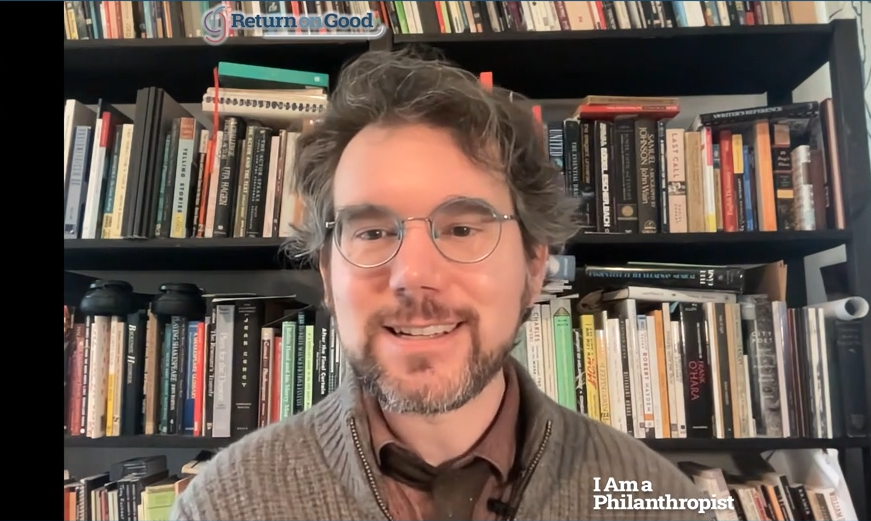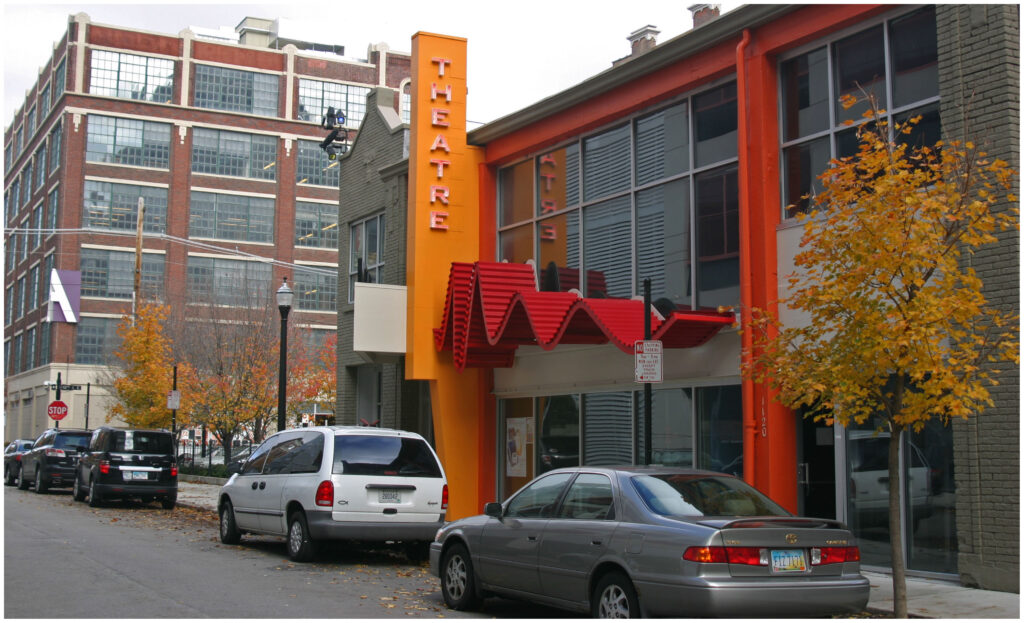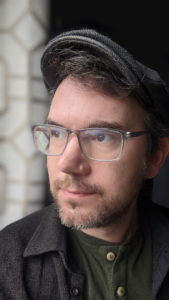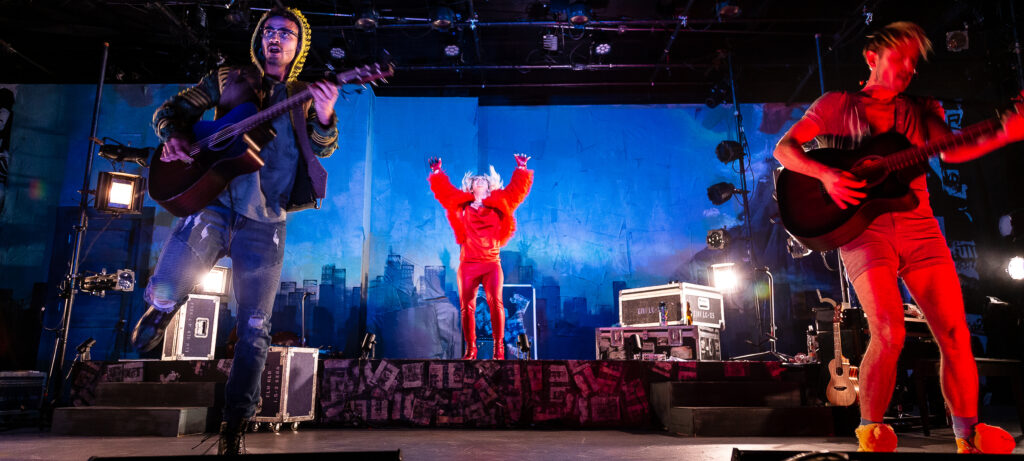
Sometimes life takes us on an unpredictable path – one that leads us to do good in the world, surprising ourselves and creating a positive impact on the lives of others. Andrew Hungerford’s plans for a career in space science shifted as fate would have it. With a dual major in astrophysics and theater, he […]
Sometimes life takes us on an unpredictable path – one that leads us to do good in the world, surprising ourselves and creating a positive impact on the lives of others.
Andrew Hungerford’s plans for a career in space science shifted as fate would have it. With a dual major in astrophysics and theater, he intended to go toward astrophysics, eventually grad school and then audition for plays on the side. But it was a London study abroad trip that changed his trajectory. He happened upon a theater production called “The Far Side of the Moon”, a solo show in which an actor plays two characters who are twin brothers, one of whom is obsessed with astronomy.
It was after seeing that show that Andrew knew being involved in theater was his personal mission. He quickly shifted his educational focus and zeroed in on theater design, then pursued a graduate degree in theatrical design at the University of Cincinnati. His engagement from that point on was toward the Cincinnati art scene, which led him to become the Producing Artistic Director for the Know Theatre in Cincinnati, Ohio.

The Know Theatre was founded in 1997 as Know Theatre Tribe, to produce multicultural theater in Cincinnati, a model focused on highlighting diverse and underserved voices. What began as a traveling event at local bookstores, producing new plays, settled its performances in the space of a church basement in historic Over-the-Rhine. Eventually Know Theatre moved to a dedicated space purchased for use by one of its longtime supporters, David C. Herriman, and he left that real estate as a gift in perpetuity upon his death. Hungerford notes this was a huge and lasting asset for the nonprofit. “There are a lot of reasons that donors make transformative gifts to individual organizations. Some of them are a personal affinity for the organization itself. Sometimes it’s a connection with the kind of work that’s being done, and sometimes it’s a really strong belief in the core mission. In the case of the gift of our building, it was in part because of the audacity and ambition of the company.”
Return on Good: How is your work philanthropic?
Andrew: I often like to think about philanthropy in this sort of broader context, because there is the idea of planting trees under whose shade you do not intend to sit in terms of building up a legacy and a world that is better for future generations. A question that I always ask myself is why can’t we just have a better world now?
Why can’t we make a better world for those of us who’re living in it right now for future generations? The choices that we make to improve the world for all of us and each other will ripple into the future. As the leader of a small organization, I work multiple full time jobs for much less than I might make in a corporate environment or a larger institution. It is because of my work that these six other people on staff continue to have jobs and have health insurance, and then the work of all of us together are what enable us to employ dozens of artists every year who come and perform in our shows. All of that work feeds into our Fringe Festival, where we then have hundreds of artists who get to come and participate and have their work seen by a large and appreciative community and (they) get to make some money that goes towards their lives and helps facilitate that future art.
Each of these small steps makes the world better. It’s each of these small gestures in the moment that really does have such a big ripple across our present and then into the future.
Return on Good: What is the mission of Know Theatre?
Andrew: We’ve maintained our focus on underserved voices. That can focus on anything from any kind of story that’s not seen frequently on stage – from marginalized communities to stories that are science fiction and fantasy. Often the stories that are science fiction and fantasy have a pretty big intersection with marginalized communities. We also have a commitment to gender parity and the playwrights that we produce. Over the course of our seasons, we produce at least 40% of our work by BIPOC playwrights. So the artists who create and perform in our work truly reflect the city that’s around us.
Return on Good: How does the Know Theatre support artists?
 Andrew: One of the principles that we have at the Know is that all artists deserve to be paid a living wage because artwork is work. It’s something that people have studied and devoted their lives to. And so for the time that they’re working with our company, we owe them that amount of money. And so for our actors, for example, our standard actor work week is about 30 hours a week.
Andrew: One of the principles that we have at the Know is that all artists deserve to be paid a living wage because artwork is work. It’s something that people have studied and devoted their lives to. And so for the time that they’re working with our company, we owe them that amount of money. And so for our actors, for example, our standard actor work week is about 30 hours a week.
We’re paying for the experience that they bring to the room and the years of study that they’ve done to achieve that level of expertise. We believe in equitable pay across the board. So actors get compensated at the same rate, whether or not they’re a member of the Union Actors Equity.
We want to make sure that everyone is supported equally. Another aspect of our pay equity is that we have a fairly flat compensation structure across our staff for our full time employees. So currently, our full time employee minimum is $40,000 a year, but the highest pay rate at our organization is $45,000 a year. So we keep everything fairly flat between employees because we never want an executive to be compensated at a rate that is highly out of proportion to the work that everyone else at the organization is doing.
Return on Good: How does the Know Theatre create equity? (Innovative Ticketing)
Andrew: We believe in economic accessibility for the arts and that the cost of a ticket should never prevent someone from experiencing a show. We believe that theater shouldn’t just be an entertainment for the elite, but that it really does belong to everyone. When I first took over as Artistic Director, we introduced a program called The Welcome Experiment, which was inspired by the radical hospitality program of Mixed Blood in Minneapolis.
Our Welcome Experiment nights, (Wednesday night performances), tickets are $5 to reserve in advance or free for walk ups so that if people see a poster and want to see a show or hear about us on NPR, they can come in and just see the show and not have to worry about how that impacts their life financially.
Beyond that, we want to make sure that the rest of our ticket pricing is accessible, but still also supports our efforts to pay a living wage. So we have tiered ticket pricing. We have three different tiers that people can choose to pay what they wish for each performance.

Return on Good: How does the Know Theatre produce challenging works?
Andrew: The work that we do, because it is focused on underserved voices, tends to push the boundaries of what’s often seen on stage. One of the cases that we make for our work is we do the kind of play that you can’t see anywhere else because our focus is also specifically on new work that is really responsive to the moment, to how artists are feeling, often things that are bubbling up through the larger cultural zeitgeist. And we can tackle those issues in a really agile way. One of the things that we try to do is to create an environment that is comforting and welcoming so that audiences have a place where they feel that they can engage with thorny or challenging ideas so that we want the experience of being at the theater to be one where you feel welcome to take on these more challenging ideas.
Ready to Do the Best?
If you’re a philanthropist with an inspiring story to tell (or know someone who is), contact Return on Good. Our impact stories are inspiring people across the world to step up and make an impact. Your sponsorship of an Impact Story will not only inspire others to do more but will provide us with the opportunity to tell more stories through your support.